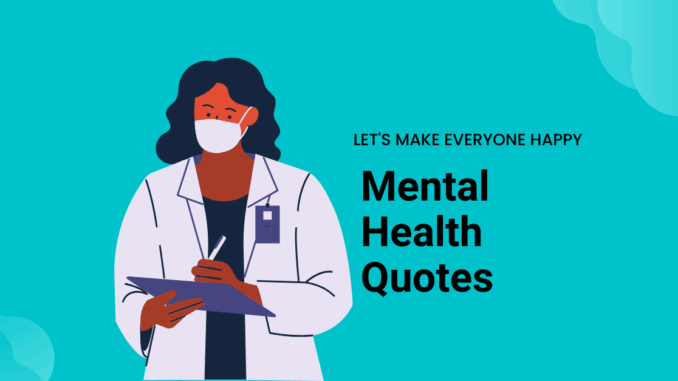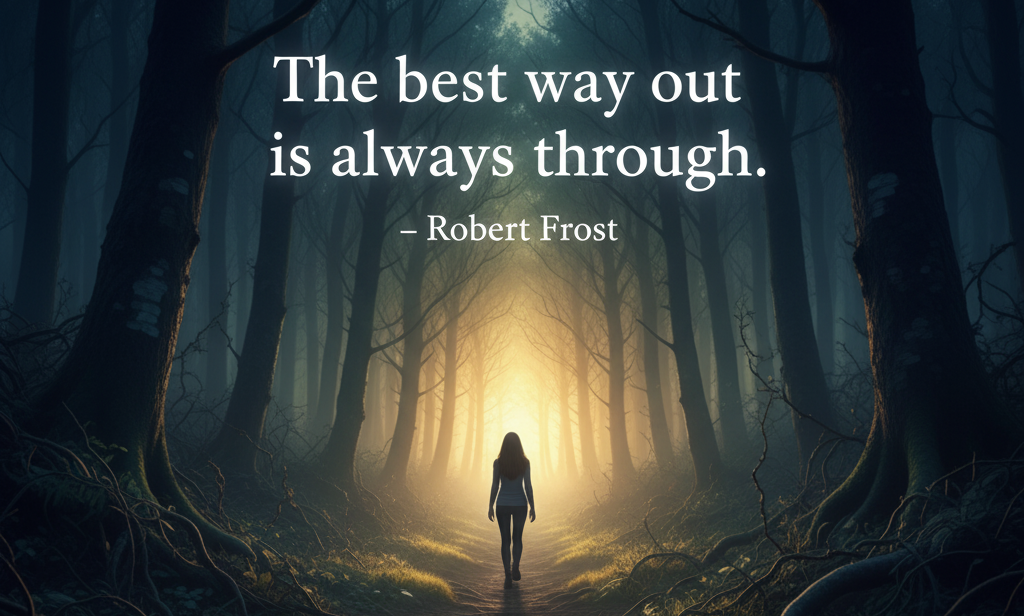
Mental Health Quotes: 10 Powerful Sayings to Promote Well-being
In the tapestry of life, there are moments when the threads of our minds can feel tangled, frayed, or even broken. During these challenging times, a simple phrase, a profound thought, or a resonate quote can act as a beacon of light. Mental health quotes have a unique power: they validate our experiences, remind us that we’re not alone, and often offer a fresh perspective that can shift our entire outlook.
This blog post is more than just a collection of inspiring words; it’s a curated guide to 10 powerful mental health quotes designed to promote well-being, foster resilience, assist you in finding your mental tranquility. Each quote is accompanied by an explanation of its profound meaning and practical ways you can integrate its wisdom into your daily life to cultivate a healthier mindset.
The Transformative Power of Words
Why do words hold such sway over our emotional and mental states? Our brains are wired for narrative. When we encounter a quote that perfectly articulates what we’re feeling, or offers a perspective we hadn’t considered, it can create a powerful cognitive shift. Mental health quotes serve several crucial functions:
- Validation: They confirm that our struggles are universal, reducing feelings of isolation and shame.
- Perspective Shift: They offer new ways to view challenges, helping us find meaning or solutions.
- Inspiration: They reignite hope and motivate us to take positive action for our well-being.
- Reminders: They serve as concise anchors for important truths we might forget in moments of distress.
Let’s dive into these powerful sayings that can make a tangible difference in your mental health journey.
READ ALSO Mental Health Tips: How to Stop Overthinking, Practical Tips to Quiet Your Mind
1. “The best way out is always through.” – Robert Frost
This quote, from the renowned poet Robert Frost, is a profound truth about facing adversity. When we’re struggling with difficult emotions, our natural inclination is often to avoid them, push them away, or distract ourselves. However, this only delays the inevitable and can even intensify the emotional backlog.
- Meaning: True healing and resolution come from confronting our feelings and challenges head-on, rather than trying to bypass them. It implies a process, a journey that might be tough, but ultimately leads to liberation.
- Practical Application for Mental Health:
- Mindful Acceptance: Instead of fighting a difficult emotion (e.g., anxiety, sadness), acknowledge its presence without judgment. “This moment holds anxiety for me, and I’m choosing not to resist it.”
- Process, Don’t Suppress: Allow yourself to feel the emotion fully, perhaps by journaling about it, talking to a trusted friend, or engaging in a healthy coping mechanism like exercise.
- Face the Small Fears: If you’re avoiding a task due to anxiety, break it down into smaller steps and take the first one. Each “through” builds resilience.

2. “You don’t have to control your thoughts. You just have to stop letting them control you.” – Dan Millman
This powerful insight from author Dan Millman is a game-changer for anyone who feels overwhelmed by their own mind. Many people mistakenly believe that good mental health means having no negative thoughts. This is an unrealistic and impossible goal.
- Meaning: Our minds are thought-generating machines; stopping them is like trying to stop your heart from beating. The key is not to eliminate thoughts, but to change your relationship with them. You are not your thoughts, and you don’t have to believe or act on every single one.
- Practical Application for Mental Health:
- Thought Defusion: Practice techniques like imagining thoughts as clouds floating by, or observing them without judgment as if you’re watching a movie.
- Cognitive Reframing: Challenge negative thoughts. Ask: “Is this 100% true? Is this helpful? What’s an alternative perspective?”
- Anchor to the Present: When thoughts race, use your senses to ground yourself in the present moment (e.g., “What five things can I see right now?”).
3. “The quieter you become, the more you can hear.” – Ram Dass
In our noisy world, external distractions and internal chatter can drown out crucial insights. Ram Dass’s quote emphasizes the profound wisdom found in stillness and introspection.
- Meaning: By intentionally stepping away from constant stimulation and cultivating inner quiet, you create space to hear your intuition, understand your true needs, and gain clarity on problems. It’s about listening to your inner voice over the clamor of the outside world.
- Practical Application for Mental Health:
- Daily Stillness: Dedicate 5-10 minutes each day to quiet contemplation or meditation. Even sitting silently with a cup of tea can work.
- Digital Detox: Regularly unplug from devices to reduce external noise and allow your mind to wander and process.
- Journaling: Use journaling as a way to explore thoughts and feelings without external pressure, fostering self-discovery.
4. “It’s okay to not be okay. Just don’t stay there.” – Unknown
This simple yet profound quote offers both radical acceptance and gentle encouragement. It validates the human experience of struggle while advocating for resilience and growth.
- Meaning: It’s a powerful affirmation that emotional pain and struggle are natural parts of life, and there’s no shame in experiencing them. However, it also reminds us of our agency – that while we can acknowledge difficult feelings, we also have the capacity and responsibility to take steps towards healing and improvement.
- Practical Application for Mental Health:
- Self-Compassion: Offer yourself the gentle understanding and patience you’d generously share with a loved one.
- Identify Small Actions: When you feel stuck, identify one small, actionable step you can take to move forward (e.g., “I’ll go for a 10-minute walk,” “I’ll text a friend”).
- Seek Support: Understand that “not staying there” often involves reaching out to a therapist, friend, or support group.
5. “Progress, not perfection.” – Unknown
This is a mantra for anyone striving for personal growth, particularly in the realm of mental health. The pursuit of perfection can be paralyzing and counterproductive.
- Meaning: It shifts the focus from an unattainable, flawless ideal to consistent, incremental improvement. It acknowledges that setbacks are part of the journey and that every small step forward is a victory.
- Practical Application for Mental Health:
- Celebrate Small Wins: Acknowledge and appreciate every effort you make towards your well-being, no matter how small.
- Reframe Setbacks: View challenges as learning opportunities rather than failures.
- Realistic Expectations: Set achievable goals for your mental health journey, understanding that change is gradual.
6. “The wound is the place where the Light enters you.” – Rumi
The Persian poet Rumi offers a beautifully profound perspective on pain and suffering. This quote encourages us to see our vulnerabilities and past hurts not as weaknesses, but as conduits for growth, wisdom, and profound personal transformation.
- Meaning: Our most challenging experiences, when faced and processed, can become sources of deep understanding, empathy, and strength. It suggests that growth often emerges from our darkest moments.
- Practical Application for Mental Health:
- Reflective Journaling: Explore past pains in a journal, looking for lessons learned or ways you’ve grown.
- Find Meaning: Ask how a difficult experience has shaped you for the better, even if subtly.
- Connect with Others: Share your story; your vulnerability can be a source of light for others.
7. “Happiness can be found, even in the darkest of times, if one only remembers to turn on the light.” – Albus Dumbledore (J.K. Rowling)

This beloved quote from the Harry Potter series reminds us that even when external circumstances are bleak, we retain the power to choose our internal focus. It’s about active hope.
- Meaning: While joy might not always be readily apparent, there’s always an opportunity to seek out positivity, practice gratitude, or find small moments of light, even when everything feels overwhelming. It emphasizes agency in our emotional experience.
- Practical Application for Mental Health:
- Gratitude Practice: Regularly list things you are grateful for, no matter how small.
- Seek Joyful Moments: Intentionally engage in activities that bring you joy, even for a few minutes.
- Positive Affirmations: Use positive self-talk to counteract negative thought patterns.
8. “Your present circumstances don’t determine where you can go; they merely determine where you start.” – Nido Qubein
This quote from motivational speaker Nido Qubein is a powerful reminder of agency and future potential, especially when current difficulties feel insurmountable.
- Meaning: No matter how challenging or limiting your current situation might be, it doesn’t define your entire future. It’s simply your starting point. You have the power to influence where you go from here, step by step. This perspective is vital for cultivating hope and motivation in your mental health journey.
- Practical Application for Mental Health:
- Focus on the Next Step: Don’t get overwhelmed by the entire journey. Identify the very next small, actionable step you can take.
- Visualize Your Future: Spend time envisioning the positive changes you want to make, rather than dwelling on current limitations.
- Growth Mindset: Believe in your capacity to learn, adapt, and grow, regardless of past or present difficulties.
9. “Talk about your feelings. It’s okay. It’s human. And it might just help someone else.” – Unknown
This quote emphasizes the dual power of vulnerability: it heals the individual and builds community. The simple act of speaking up about one’s internal world is a cornerstone of good mental health.
- Meaning: There is strength, not weakness, in expressing emotions, especially difficult ones. This act of sharing is fundamentally human, and by doing so, we not only alleviate our own burden but also create space for others to feel understood and less alone. It’s a direct counter to the stigma surrounding emotional expression.
- Practical Application for Mental Health:
- Open Up to a Trusted Person: Share your feelings with a friend, family member, or partner whom you trust.
- Seek Professional Help: Don’t hesitate to speak to a therapist or counselor. They provide a safe, confidential space for emotional processing.
- Participate in Support Groups: Connect with others who understand similar struggles.
10. “The greatest weapon against stress is our ability to choose one thought over another.” – William James
William James, often referred to as the “Father of American psychology,” succinctly captures the essence of cognitive control in this brilliant quote. It highlights our inherent power to direct our mental energy.
- Meaning: While external stressors are often beyond our control, our internal response—how we think about and react to those stressors—is largely within our power to choose. This ability to redirect our focus from unhelpful, anxiety-provoking thoughts to more constructive or calming ones is a fundamental skill for stress management and robust mental health.
- Practical Application for Mental Health:
- Mindful Re-direction: When you catch yourself spiraling in negative thoughts, consciously choose a different focus (e.g., focus on your breath, a task, or a positive memory).
- Thought Stopping: Acknowledge the unhelpful thought, and then mentally or verbally say “Stop” or “Not now” to interrupt its momentum.
- Positive Affirmations: Replace negative self-talk with empowering affirmations or factual observations.
The Continuous Journey of Well-being

These mental health quotes are not magic spells, but they are potent reminders and powerful tools. They encapsulate timeless wisdom that can guide you through life’s inevitable ups and downs. By reflecting on their meanings and actively applying their lessons, you are not just reading words; you are engaging in a proactive practice of self-care and resilience-building.
Let these sayings be your anchors on stormy days, your compass when you feel lost, and your quiet cheerleaders on the path to lasting well-being. Your mental health is a journey, and with these powerful insights, you are well-equipped to navigate it with grace and strength.

Leave a Reply